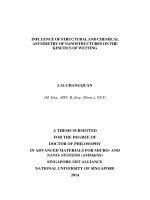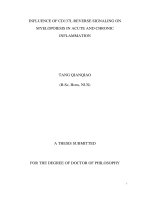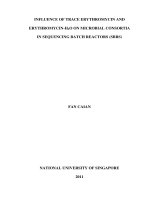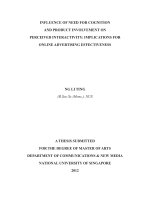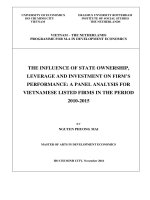Influence of GA3 and date of sowing on growth and development of custard apple seedlings
Bạn đang xem bản rút gọn của tài liệu. Xem và tải ngay bản đầy đủ của tài liệu tại đây (290.87 KB, 9 trang )
Int.J.Curr.Microbiol.App.Sci (2019) 8(1): 1813-1821
International Journal of Current Microbiology and Applied Sciences
ISSN: 2319-7706 Volume 8 Number 01 (2019)
Journal homepage:
Original Research Article
/>
Influence of GA3 and Date of Sowing on Growth and Development of
Custard Apple Seedlings
Pritee Rahangdale1*, S.K. Pandey1 and D.K. Jayswal2
1
Department of Horticulture, Jawaharlal Nehru Krishi Vishwa Vidyalaya,
Jabalpur (M.P.) – 482004, India
2
NAHEP, Krishi Anusandhan Bhawan – II, ICAR, Pusa, New Delhi – 110 012, India
*Corresponding author
ABSTRACT
Keywords
Custard apple,
GA3, Fresh weight,
Dry weight, Plant
height, Stem girth
Article Info
Accepted:
12 December 2018
Available Online:
10 January 2019
A field experiment was conducted at fruit research station, Imliya, Jawaharlal Nehru
Krishi Vishwa Vidyalaya, Jabalpur to study the influence of GA3 and date of sowing on
growth and development of custard apple seedlings. Significantly, maximum fresh weight
of roots (0.75g), dry weight of root (0.20g) and total dry matter (0.37g) were obtained at
120 days after germination under 500ppm GA3 treatment. Minimum of these attributes was
registered with untreated seeds. Among different sowing dates, D4 recorded maximum
fresh weight of roots (0.87g), dry weight of roots (0.24g) and total dry matter (0.370g),
while D1 recorded minimum of these attributes. However, When seeds were treated with
500ppm GA3 increased the height of the plants and maximum was recorded (4.24, 5.64,
9.79 and 12.86cm), girth of stem (1.20, 2.10, 2.93 and 4.68mm) and number of leaves per
seedlings (4.18, 6.27, 9.42 and 13.86) at all stage of observations i.e. 30, 60, 90 and 120
days after sowing respectively. Whereas, treatment control gave minimum plant height,
girth of stem and number of leaves per seedling at all the stage of observations. Interaction
effect of GA3 and date of sowing was found significant and maximum fresh weight, dry
weight, total dry matter, plant height, girth of stem and number of leaves per seedling was
recorded with D4G3.
Introduction
Custard apple (Annona squamosa L.) is one of
the delicious fruits relished by many for table
purpose, pleasant flavor; mild aroma and
sweet taste have a universal acceptance. It is
also known by different names such as sugar
apple, Sharifa, Sitaphal and Attichaka in
different parts of growing regions. It is widely
cultivated in Andhra Pradesh, Maharashtra,
Karnataka, Bihar, Orissa, Assam and Tamil
Nadu
beside
Madhya
Pradesh
and
Chhattisgarh. It has gained commercial
significance and exclusive orchards are
emerging in Andhra Pradesh and Maharashtra.
Custard apple is propagated both through
seeds and vegetative methods. Seed
propagation is even now widely fallowed
resulting in great variability in seedling
population. Seeds extracted from ripe fruits
1813
Int.J.Curr.Microbiol.App.Sci (2019) 8(1): 1813-1821
are used for sowing. The use of plant growth
regulators in proper concentration with
scarification may regulate seed germination
and seedling growth behavior in many fruit
crops. Pre-sowing treatment of growth
regulators could lead to increase seed
germination and enhancement of seedling
growth. A low concentration of plant growth
regulators may be ineffective; on the other
hand, higher concentration may inhibit the
growth. Seed without use of growth regulators
showed poor response for germination and
subsequent growth. Plant growth regulators
like GA3, IBA, and IAA enhance the
germination, growth and survival of seedlings.
GA3 are used for weakening of the seed coat
so that the emergence of radical and plumule
is positively influenced for root and shoot
formation. Custard apple seed does not
germinate immediate after extraction due to
long period of dormancy. Therefore, seeds are
sown in the rainy season after long period of
storage for rising of seedlings. Looking to the
above mentioned fact, the experiment was
carried out to study the change in growth and
development of custard apple seedlings after
application of GA3 concentrations and keeping
different date of sowing.
Materials and Methods
The present investigation was carried out at
fruit research station, Imalia, Jawaharlal
Nehru Krishi Vishwa Vidyalaya, Jabalpur
(M.P.) during November 2013 to April 2014.
Selected well ripened healthy and disease free
58 fruits of custard apple were taken for seed
extraction. Seeds were separated from pulp
and washed properly in clean water. Healthy
and well developed seeds were selected from
the extracted seeds. 720 seeds were taken for
each treatment in each replication. The
experiment consisted of two factor; i.e. factor
(A) date of sowing which are denoted by D1
(2nd Nov., freshly extracted seed), D2 (5th
Nov., 3 days after extracted seed), D3 (8th
Nov., 6 days after extracted seed), D4 (11th
Nov., 9 days after extracted seed) and factor
(B) GA3 concentration; G0 (control), G1 (200
ppm), G2 (400 ppm), G3 (500 ppm).The
preparation of GA3 solutions (200, 400 and
500 ppm concentration) from 200 mg, 400
mg and 500 mg of GA3 respectively were
taken and each of dissolved separately in 5-10
ml of ethyl alcohol and then the volume was
made to 1000 ml by adding distilled water.
The extracted 50 seeds were soaked for 12
hours in GA3 solutions of each concentration
and water. Treatment of polythene bags were
done with treated with the help of fungicide.
The seeds were sown in polythene bags of (30
x 15cm) filled with a mixture of soil, sand,
FYM in the ratio of 1:1:1. The sowing of
custard apple seeds was done on 2nd
November 2013. Watering and other
operations were done as per requirements.
In this experiment, the response of different
concentrations of GA3 and different dates of
sowing were evaluated for growth and
development of custard apple seedlings. The
experiment was laid out in factorial CRD as
show in each treatment was replicated thrice
randomly. The following observations were
recorded at 120 days after sowing. Randomly
selected three plants were tagged for following
observations:
Fresh weight of root (g)
Dry weight of root (g)
Total dry matter production (g)
The fallowing observations were recorded at
30, 60, 90 and 120 days after sowing.
Randomly selected five plants were tagged for
following observations:
Height of plant (cm) – Height was measured
from ground level to the tip of opened leaf.
Girth of stem (mm) – The girth of stem was
measured with the help of digital veneer
1814
Int.J.Curr.Microbiol.App.Sci (2019) 8(1): 1813-1821
calipers just above the ground surface and the
average was calculated.
Number of leaves per seedling – The total
number of leaves per seedling was counted
and the average was calculated. Matured
leaves were taken into account.
Results and Discussion
The findings are briefly discussed and
interpreted with the support of the finding of
the previous research work.
Fresh weight of root (g)
The data presented in Table 2 showed that
when seeds were treated with 500ppm GA3,
the fresh weight of roots with increased
(0.75g) at 120 days after germination and it
minimum (0.53g) when the seed are treated
(G0). The sowing date D4 indicated the
maximum fresh weight of root while the
sowing date D1 indicated the minimum fresh
weight of root. On the other hand, when
500ppm GA3 treated seed were sown in
(G3D4) the fresh weight of roots was increased
maximum (0.96g) and fresh weight of roots
was minimum when untreated (G0D1) seeds
were sown on 2nd November (FES). Increase
in fresh weight of root with increasing GA3
concentration may be due to increased auxin
level in the roots which stimulated more root
initiation, more nutrient uptake and root cell
elongation, thus resulting into increased tap
root length and number of secondary and
fibrous roots and in return increased the fresh
and dry weight. These results are in
corroborated with the findings of Randhawa et
al., (1959), Shanmugavelu (1971) and (Ratan
and Reddy (2004).
Dry weight of root (g)
The data regarding dry weight of roots as
influenced by various concentrations of GA3
and sowing dates presented in Table
2indicated that the maximum dry weight of
root (0.20g) was obtained at 120 days after
germination under 500ppm GA3 treatment and
Minimum (0.11g) was observed under
treatment G0. Among different sowing dates
D4 recorded maximum (0.24g) dry weight of
roots, while D1 recorded minimum (0.08g)
mean dry weight of roots. The interaction
effect of GA3 and dates of sowing was found
significant. Under the combination of
treatments G3D4 (0.29) significantly maximum
dry weight of roots was found at 120 days
after germination and minimum was found
under G0 D1. Similar results were also
reported by Shanmugavelu (1971).
Table.1 Details of treatment combinations
T1
D1G0
FES + control
T9
D3G0
6 day AES + control
T2
D1G1
FES + 200ppm GA3
T10
D3G1
6 day AES + 200ppm GA3
T3
D1G2
FES + 400ppm GA3
T11
D3G2
6 day AES + 400ppm GA3
T4
D1G3
FES + 500ppm GA3
T12
D3G3
6 day AES + 500ppm GA3
T5
D2G0
3 day AES + control
T13
D4G0
9 day AES + control
T6
D2G1
3dayAES + 200ppm GA3
T14
D4G1
9 day AES + 200ppm GA3
T7
D2G2
3 day AES+ 400ppm GA3
T15
D4G2
9 day AES + 400ppm GA3
T8
D2G3
3 day AES + 500ppm GA3
T16
D4G3
9 day AES + 500ppm GA3
*FES = freshly extracted seed
AES = after extracted seed
1815
Int.J.Curr.Microbiol.App.Sci (2019) 8(1): 1813-1821
Table.2 Influence of GA3 and date of sowing on fresh weight of root, dry weight of root and
total dry matter production (g) at 120 day after germination
Treatments
D1
D2
D3
D4
SEm±
CD at 5%
G0
G1
G2
G3
SEm±
CD at 5%
D1GO
D1G1
D1G2
D1G3
D2G0
D2G1
D2G2
D2G3
D3G0
D3G1
D3G2
D3G3
D4G0
D4G1
D4G2
D4G3
SEm±
CD at 5%
Fresh weight of root
(g)
0.45
0.61
0.71
0.87
0.00
0.01
0.53
0.65
0.71
0.75
0.00
0.01
0.33
0.44
0.51
0.54
0.48
0.62
0.65
0.69
0.53
0.70
0.80
0.84
0.77
0.85
0.90
0.96
0.00
0.02
1816
Dry weight of root
(g)
0.08
0.15
0.18
0.24
0.003
0.008
0.11
0.15
0.18
0.20
0.003
0.008
0.04
0.07
0.10
0.12
0.09
0.15
0.17
0.19
0.12
0.17
0.20
0.23
0.21
0.23
0.26
0.29
0.006
0.017
Total dry matter
production (g)
0.199
0.228
0.261
0.370
0.004
0.012
0.168
0.222
0.292
0.376
0.004
0.012
0.107
0.173
0.220
0.297
0.150
0.187
0.247
0.327
0.147
0.210
0.287
0.400
0.270
0.317
0.413
0.480
0.008
0.24
Int.J.Curr.Microbiol.App.Sci (2019) 8(1): 1813-1821
Table.3 Influence of GA3 and date of sowing on plant height (cm) at different successive growth
stages after germination
Treatments
30 days after
germination
D1
D2
D3
D4
SEm±
CD at 5%
G0
G1
G2
G3
SEm±
CD at 5%
D1GO
D1G1
D1G2
D1G3
D2G0
D2G1
D2G2
D2G3
D3G0
D3G1
D3G2
D3G3
D4G0
D4G1
D4G2
D4G3
SEm±
CD at 5%
1.71
3.08
4.22
5.01
0.04
0.13
2.80
3.14
3.84
4.24
0.04
0.13
1.18
1.55
1.82
2.29
2.45
2.47
3.62
3.79
3.66
3.89
4.36
5.00
3.92
4.67
5.59
5.87
0.09
0.27
Plant height (cm)
60 days after
90 days after
germination
germination
3.45
4.23
5.20
6.92
0.06
0.17
4.21
4.63
5.31
5.64
0.06
0.17
3.24
3.27
3.51
3.77
3.85
3.94
4.31
4.84
4.03
4.84
5.89
6.06
5.73
6.50
7.55
7.90
0.12
0.34
1817
7.14
8.01
10.32
10.96
0.09
0.27
8.30
8.97
9.36
9.79
009
0.27
6.50
6.87
7.36
7.83
6.60
8.01
8.30
9.15
9.95
10.33
10.50
10.51
10.18
10.66
11.30
11.69
0.18
0.54
120 days
after
germination
8.93
10.88
12.13
13.99
0.12
0.34
10.08
11.15
11.84
12.86
0.12
0.34
7.44
8.88
9.53
9.88
9.68
10.12
11.57
12.16
10.91
11.91
12.14
13.59
12.32
13.70
14.14
15.83
0.24
0.69
Int.J.Curr.Microbiol.App.Sci (2019) 8(1): 1813-1821
Table.4 Influence of GA3 and date of sowing on girth of stem (mm) at different successive
growth stages after germination
Treatments
30 days after
germination
D1
D2
D3
D4
SEm±
CD at 5%
G0
G1
G2
G3
SEm±
CD at 5%
D1GO
D1G1
D1G2
D1G3
D2G0
D2G1
D2G2
D2G3
D3G0
D3G1
D3G2
D3G3
D4G0
D4G1
D4G2
D4G3
SEm±
CD at 5%
0.84
1.04
0.95
1.39
0.01
0.02
0.95
1.01
1.05
1.20
0.01
0.02
0.69
0.93
0.77
0.95
0.99
1.16
1.05
0.95
0.99
0.86
0.95
0.99
1.15
1.09
1.42
1.92
0.02
0.05
Girth of stem (mm)
60 days after
90 days after
germination
germination
1.64
1.72
1.82
2.14
0.04
0.14
1.72
1.75
1.75
2.10
0.04
0.14
1.66
1.72
1.33
1.85
1.58
1.70
1.75
1.87
1.71
1.63
1.64
2.29
1.93
1.95
2.28
2.39
0.09
0.28
1818
2.60
2.66
2.73
3.32
0.64
0.19
2.62
2.84
2.91
2.93
0.64
0.19
2.35
2.67
2.73
2.60
2.41
2.96
2.64
2.65
2.73
2.36
2.93
2.89
3.03
3.36
3.33
3.58
0.13
0.37
120 days
after
germination
3.61
4.01
4.35
4.76
0.04
0.14
3.81
3.99
4.25
4.68
0.04
0.14
3.25
3.56
3.79
3.85
4.18
3.73
3.76
4.35
3.82
3.98
4.52
5.07
4.01
4.63
4.94
5.45
0.09
0.28
Int.J.Curr.Microbiol.App.Sci (2019) 8(1): 1813-1821
Table.5 Influence of GA3 and date of sowing on number of leaves per seedling at different
successive growth stages after germination
Treatments
30 days after
germination
D1
D2
D3
D4
SEm±
CD at 5%
G0
G1
G2
G3
SEm±
CD at 5%
D1GO
D1G1
D1G2
D1G3
D2G0
D2G1
D2G2
D2G3
D3G0
D3G1
D3G2
D3G3
D4G0
D4G1
D4G2
D4G3
SEm±
CD at 5%
Number of leaves per seedling
60 days after
90 days after
germination
germination
2.82
2.95
3.44
3.71
0.07
0.20
1.93
3.11
3.70
4.18
0.07
0.20
2.22
2.58
3.03
3.44
1.40
2.88
3.55
3.99
1.77
3.44
3.99
4.55
2.33
3.55
4.21
4.77
0.14
0.41
4.07
5.28
5.33
6.02
0.07
0.20
3.84
4.98
5.61
6.27
0.07
0.20
3.11
3.92
4.38
4.88
3.99
5.24
5.66
6.22
3.87
5.24
5.62
6.59
4.40
5.51
6.77
7.40
0.14
0.41
Total dry matter production (g)
The data for various treatments with respect
to the dry matter recovery are summarized in
7.02
7.40
8.21
10.02
0.09
0.28
6.53
8.01
8.69
9.42
0.09
0.28
5.11
6.92
7.55
8.51
6.42
7.33
7.55
8.33
6.87
7.96
8.69
9.33
7.73
9.85
10.99
11.51
0.19
0.57
120 days
after
germination
9.86
10.40
12.37
15.17
0.15
0.45
9.96
11.44
12.54
13.86
0.15
0.45
7.14
9.77
10.77
11.77
8.99
9.99
10.83
11.81
10.96
11.74
12.48
14.33
12.77
14.25
16.10
17.55
0.31
0.90
Table 2. G3 (500ppm GA3) was found to
record maximum (0.37g) dry matter, followed
by G2 (0.29g) and the minimum (0.168g) in
G0 (control).
1819
Int.J.Curr.Microbiol.App.Sci (2019) 8(1): 1813-1821
Girth of stem (mm)
The findings of stem girth were recorded at
different intervals and data summarized in
Table 4. When seeds were treated with
500ppm GA3 increased the mean girth of stem
at all stage of observations (1.20, 2.10, 2.93
and 4.68mm) at 30, 60, 90 and 120 days after
sowing respectively. Whereas, seeds placed in
the rooting media in intervals (30, 60, 90 and
120days) the fourth sowing date is D4 gave
maximum girth (1.39, 2.14, 3.31 and
4.76mm) at different intervals respectively.
The interaction of GA3 and sowing date
(G3D4) maximum mean stem girth (1.92,
2.39, 3.58 and 5.45) at 30, 60, 90 and 120
days was recorded. While girth was observed
when untreated seeds sown. The gibberellic
acid increases the girth of stem in custard
apple mainly due to cell elongation, increase
in cell size and rapid cell division. Due to this,
the elongation of internodes will takes place,
hence the girth of stem will increase. These
results are in agreement with the findings of
Harshavardhan and Rajsekhar (2012) and
(Meena and Jain, 2012).
Number of leaves per seedling
The data as regarded number of leaves per
seedling as influenced by different
concentration of GA3 and sowing dates
presented in Table 5 indicated that the
maximum mean number of leaves per
seedlings was produced by the seedling
treated with 500ppm GA3 (4.18, 6.27, 9.42
and 13.86) at 30, 60, 90 and 120 days after
sowing whereas treatment control gave
minimum mean number of leaves per seedling
at all the stage of observations. Among
different sowing dates, D4 encouraged leaf
production and gave significantly maximum
(3.71, 6.03, 10.02 and 15.17) mean number of
leaves per seedling at 30, 60, 90 and 120 days
after sowing respectively. The treatment
combination G3D4 produced maximum
number of leaves per seedling (i.e. 4.77, 7.40,
9.42 and 17.55) at 30, 60, 90 and 120 days
after sowing. While number of leaves was
reduced when untreated seeds sown. Increase
in a number of leaves in GA3500 ppm might
be due to the maximum height of seedlings
under this treatment. This also helps in
invigoration of physiological process of plant
and stimulatory effect of chemicals to form
new leaves at faster rate as suggested by
Shaban (2010). The production of more
number of leaves in gibberellic acid
treatments may be due to the vigorous growth
with more number of branches and leaves
which in turn facilitates better harvest of
sunshine by the plants to produce more
photosynthates. The above results are in
conformity with the findings of Pampanna et
al., (1995) and (Pal and Dhaka, 2010).
On the basis of findings, it could be
concluded that the GA3 (500ppm) is the best
as compare to other GA3 concentrations for
influencing the growth and development of
seedling. As regards, the sowing dates, D4
were found to be the most suitable sowing
date under study for growth and development.
However, the G3D4 gave the most superior
results.
References
Deb, P.A., Das, S.K., Ghosh, C.P. and Suresh.
(2010).
Improvement
of
seed
germination and seedling growth of
papaya (Carica papaya L.) through
different pre-sowing seed treatments.
Acta Horticulture, (851): 313-316.
Harshavardhana, M. and Rajasekhar, M.
(2012). Effect of pre-sowing seed
treatments on seedling growth of
jackfruit (Artocarpus heterophyllus
Lam.). Journal of Research ANGRAU,
40(4): 87-89.
Meena, R.R. and Jain, M.C. (2012). Effect of
seed treatment with GA3 on growth
1820
Int.J.Curr.Microbiol.App.Sci (2019) 8(1): 1813-1821
parameters of papaya seedling (Carica
Papaya). Progressive Horticulture,
44(2): 248-250.
Murthy, B.N.S. and Reddy, Y.N. (1990).
Temperature dependence of seed
germination and seedling growth in ber
(Zizyphus mauritiana Lam.) and their
modification by pre-sowing treatments.
Seed Science and Technology, 18(3):
621-627.
Pal, S.L. and Dhaka, S.S. (2010). Effects of
GA3 on germination of seeds and
growth of seedlings of sweet orange
(Citrus
sinensis).
Progressive
Agriculture, 10(1): 166-167.
Pampanna, Y., Sulikeri, G.S. and Hulmani,
N.C. (1995). Effect of growth
Regulators on seed germination and
growth of seedling of Sapota.
Karnataka Journal of Agriculture
Science, 8(1): 60-64.
Randhawa, G.S. and Sing, J.P. (1959).
Growth response of citrus seedling roots
stock to GA. Indian Journal of
Horticulture, 116(2): 76-78.
Ratan, P.B. and Reddy, Y.N.(2004). Influence
of gibberellic acid on custard apple
(Annona
squamosa
L.)
seed
germination and subsequent seedling
growth. Journal of Research ANGRAU,
32(2): 93-95.
Shaban, A.E.A. (2010). Improving seed
germination and seedling growth of
some mango rootstocks. AmericanEurasian Journal of Agricultural and
Environmental Science, 7 (5): 535-541.
Shanmugavelu, K.G. (1971). Effect of plant
growth regulaters of jack (Artocarpus
heterophyllus). Madras Agriculture
Journal, 58(2): 97-103.
Wagh, A.P., Choudhary, M.H., Kulwal, L.V.,
Jadhav, B.J. and Joshi, P.S. (1998).
Effect of seed treatment on germination
of seed and initial growth of aonla
seedling in polybag. PKV Research
Journal, 22(2): 176-177.
How to cite this article:
Pritee Rahangdale, S.K. Pandey and Jayswal, D.K. 2019. Influence of GA3 and Date of Sowing
on Growth and Development of Custard Apple Seedlings. Int.J.Curr.Microbiol.App.Sci. 8(01):
1813-1821. doi: />
1821

